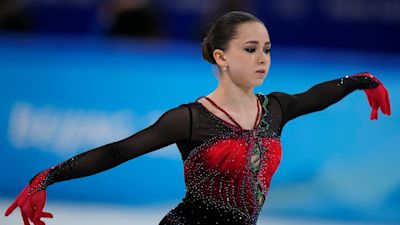Russia's star figure skater Kamila Valieva fails to win medal after failed drugs test controversy

Russia's star figure skater, who's been mired in a doping controversy, has failed to win a medal at the Winter Olympics in Beijing after falling several times in her final routine.
Kamila Valieva was allowed to compete, despite previously testing positive for a banned substance, and plans were in place to delay the awarding of medals if she were to reach the podium - as had been widely expected.
But that prediction failed to materialise as the 15-year-old came in fourth during Thursday's final.
Why was Valieva allowed to compete after failing a drugs test?
The Court of Arbitration for Sport cleared the teenager to continue competing, allowing her to compete in the finals, after citing “exceptional circumstances” for its decision.
Russia's anti-doping body is to investigate the matter, so Valieva could still be stripped of the golds she won in the team events.
Among these was the skater's status as a “protected person” under the World Anti-Doping Code, “serious issues” in the process of notifying Valieva of her result, and the fact a suspension could cause her “irreparable harm”.
In a further extraordinary twist on Monday, the International Olympic Committee (IOC) responded to the ruling by declaring that if Valieva did finish in the top three, there would be no medal ceremony.
The medals would instead have been retrospectively presented once the full case had been concluded – which could take months or even years.
Lawyers for Valieva "brought some doubts about her guilt" and suggested the positive sample of banned heart medication, trimetazidine, was accidental rather than deliberate doping, a veteran IOC member said earlier in the week.
“Her argument was this contamination which happened with a product her grandfather was taking," Denis Oswald, a Swiss lawyer who has prosecuted previous Russian doping cases, told reporters.
How did that go down within the Olympic community?
On the one hand, the case has prompted concern for the welfare of Valieva and other child athletes. Indeed, the teenager was in tears at the end of her final performance on the ice on Thursday.
The debacle has also raised questions over the Olympic status of Russia, which is already banned from having its anthem and flag at the Games because of past doping cases.
Others have levelled accusations of racism at the sporting bodies involved.
US sprinter Sha'Carri Richardson, who was banned for a month and missed last year's Olympic Games after testing positive for cannabis, tweeted earlier in the week: "The only difference I see is I'm a black young lady."
In response the IOC claimed "there isn't a great deal of similarity between the two cases" with spokesman Mark Adams adding: "Every single case is very different."
Richardson was expected to be one of the biggest draws in Tokyo after winning the 100 metres in 10.86 seconds at the US trials. She said she smoked cannabis after hearing from a reporter that her biological mother had died - a week before Olympic trials were due to begin.
The 21-year-old tested positive at the US Olympic trials in Oregon - a state where cannabis is legal. However, one of the chemicals it contains, THC, is banned in athletics.